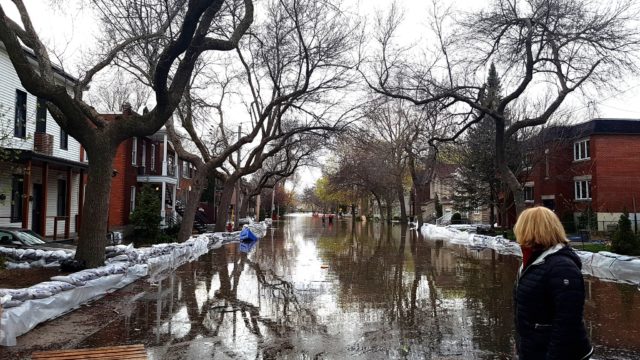On Nov. 12, people across Canada joined my colleague Tony Maas (Ecojustice’s director of legislative affairs) and I for a special Q+A climate law Q+A session with scholar and climate activist Dr. Anne Keary. As it turns out, the timing of this conversation couldn’t have been any better: One week later the federal government tabled the Canadian Net-Zero Emissions Accountability Act (Bill C-12).
We were pleased by this development. Climate activists, members of the public and environmental organizations like Ecojustice have worked tirelessly to push the federal government to introduce a climate law that holds decision-makers accountable for reducing emissions and putting Canada on the path to net-zero by 2050.
The federal government made good on its promise to Canadians during the last federal election to introduce a law and key accountability mechanisms to achieve net-zero. That said, in its current form Bill C-12 falls short of establishing a world-class climate accountability framework that would position Canada alongside leading nations such as the UK and New Zealand
During the Q+A session, those who attended had a lot of questions about how a climate accountability law could work in Canada. Unfortunately, due to time constraints, I could only answer a few.
Now that we have a climate bill on the table, the Ecojustice team will be looking to work with all parties in Parliament to deliver a truly robust climate accountability framework and have developed some high-level recommendations on how Bill C-12 can be improved with CAN-RAC, Environmental Defence, West Coast Environmental Law and Équiterre.
I thought this would be the perfect time to answer some of your outstanding questions and address ones that have likely come up in the wake of Bill C-12’s introduction.
Q: Do you think that a climate accountability law is the number one thing we need to achieve our climate targets?
Strong climate laws are essential to tackling the climate emergency. They have worked in other countries and they can work in Canada too. The United Kingdom set the benchmark for a climate law that holds the government accountable for reducing emissions. Since passing the Climate Change Act in 2008, has managed to reduce its GHG emissions to 44 per cent below 1990 levels.
Climate plans will set out how Canada will reduce emissions, but a strong climate law holds the federal government to account for making plans that will actually meet the targets, and for delivering the action those plans call for.
Q: Will Bill C-12 help Canada achieve its 2030 target?
The Intergovernmental Panel on Climate Change has made a clear and stark warning – we have less than a decade to prevent climate disaster. Bill C-12 puts in place the mechanisms for the federal government to achieve net-zero by 2050, but the next nine years are critical if we are to turn the tide of climate change.
That means this federal government can’t leave climate action to a future government, so Bill C-12 must also be able to hold this government to account for taking strong climate action now.
To date, Canada has missed every single emission-reduction target it has ever set. The federal government has promised to exceed its 2030 target, but as it stands Bill C-12 doesn’t do enough to hold the federal government accountable to achieve this target over the next nine years.
Political parties must work together to strengthen the bill and pass a version that will drive ambitious emissions reductions over the next decade.
Q: Does Bill C-12 make sure provinces reduce emissions?
The result of Canadian federalism and our regional disparity in emissions requires an ongoing conversation about how to share the effort of reducing our GHG emissions between federal, provincial, territorial and municipal governments, and respect Indigenous rights and authority. All have critical roles to play in fighting the climate emergency. Bill C-12 aims to hold the federal government accountable for achieving net-zero by 2050, but doesn’t take this historic opportunity to institutionalize the effort-sharing conversation, let alone push for the cooperative federalism that the challenge of climate change requires.
We hope this is something all parties can work together to address as Bill C-12 goes through the parliamentary process. For example, Bill C-12 should incentivize and facilitate provincial ambition and recognize shared action. It must also require transparency about the status and direction of greenhouse gas emissions in sub-national jurisdictions.
Q: How far in advance would the carbon budgets be set?
Bill C-12 delivers an outline of what Ecojustice and other environmental organizations asked the federal government for in the legislation. It mandates, for example, clear accountability measures such as plans and reports.
However, these accountability measures are not yet strong enough. To give one example, Bill C-12 uses milestone year (2030, 2035, 2040, 2045) targets instead of our recommended five-year carbon budgets, which are a much better tool for accountability. Furthermore, Bill C-12’s milestone targets and the plans to meet those targets only have to be set five years in advance. For comparison, the U.K’s climate law sets its five-year carbon budgets12 years in advance, and the plans to meet those targets have to be set soon after – there simply must be more lead time between a target year and the deadline to set and plan for that target.
Longer lead times, ten years for example, between setting targets and plans and the actual milestone year, would provide more certainty for everyone, including industry, and would help all interested parties to make the changes necessary to adapt to a low-carbon economy.
Q: Who is the expert committee and what role will they play?
If we have learned anything from the COVID-19 pandemic, it is the importance of listening to scientific experts and heeding their advice on critical issues. An arms-length expert climate advisory committee can advise on targets, plans and policy solutions and independently monitor and report on how successful the federal government has been in reducing emissions.
The federal government, as it has partially demonstrated with Bill C-12 which sets out oversight roles for the Commissioner of Environment and Sustainable Development and a new Advisory body, believes in the role of experts in helping Canada to effectively reduce its emissions and reach net-zero. But as Bill C-12 stands, these two institutions lack the mandate and capacity to properly hold the Government to account. Crucially, neither body has an explicit mandate to advise on the long-term or milestone targets.
Bill C-12 must place greater emphasis on science and expertise and less emphasis on politics by strengthening the Advisory body’s role in establishing targets, planning and reporting, and ensure that the body is comprised of independent experts.
Q: Will Bill C-12 make a good climate law?
Bill C-12 is a significant step forward in tackling the climate crisis. The legislation centres on the science of climate change and Canada’s international commitments, which of course include the strong language of the Paris Agreement.
Ecojustice and other environmental organizations were looking for legislated targets, accountability measures and expert input, and Bill C-12 brings all of these elements into law.
But there are improvements which have to be made to truly deliver climate accountability, and that is where climate activists and members of the public have an important role to play.
Over the next few months, Bill C-12 will go through the parliamentary process – debated in the House of Commons, the Committee on Environment and Sustainable Development and the Senate. It will be important that members of the public voice their support for good amendments to Bill C-12 and for the legislation to pass into law.
Ecojustice will be keeping our supporters informed of all of these developments and providing opportunities to advocate for a strong climate law.
Watch the webinar, “Achieving net-zero: How a climate accountability law can get us there.”





